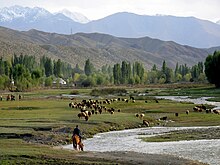Kara-Khanid Khanate
Kara-Khanid Khanate | |||||||||||||||||
|---|---|---|---|---|---|---|---|---|---|---|---|---|---|---|---|---|---|
| 840–1212 | |||||||||||||||||
 Kara Khanid Khanate, c. 1000. | |||||||||||||||||
| Status | Khaganate | ||||||||||||||||
| Capital | |||||||||||||||||
| Common languages |
| ||||||||||||||||
| Religion | |||||||||||||||||
| Government | Monarchy | ||||||||||||||||
| Khagan | |||||||||||||||||
• 840–893 (first) | Bilge Kul Qadir Khan | ||||||||||||||||
• 1204–1212 (last) | Uthman Ulugh-Sultan | ||||||||||||||||
| Hajib (chancellor) | |||||||||||||||||
• 11th century | Yūsuf Balasaguni | ||||||||||||||||
| History | |||||||||||||||||
• Established | 840 | ||||||||||||||||
• Disestablished | 1212 | ||||||||||||||||
| |||||||||||||||||
| History of Central Asia | ||||||||||||||||||||
|---|---|---|---|---|---|---|---|---|---|---|---|---|---|---|---|---|---|---|---|---|
 | ||||||||||||||||||||
| Ancient | ||||||||||||||||||||
|
||||||||||||||||||||
| Middle Ages | ||||||||||||||||||||
|
||||||||||||||||||||
| Colonization period | ||||||||||||||||||||
|
||||||||||||||||||||
| Great game period | ||||||||||||||||||||
|
||||||||||||||||||||
| Topics | ||||||||||||||||||||
|
||||||||||||||||||||
The Kara-Khanid Khanate (Persian: قراخانیان, romanized: Qarākhāniyān; Chinese: 喀喇汗國), also known as the Karakhanids, Qarakhanids, Ilek Khanids[6] or the Afrasiabids (Persian: آل افراسیاب, romanized: Āl-i Afrāsiyāb, lit. 'House of Afrasiab'), was a Turkic khanate that ruled Central Asia in the 9th through the early 13th century. The dynastic names of Karakhanids and Ilek Khanids refer to royal titles with Kara Kağan being the most important Turkic title up till the end of the dynasty.[7]
The Khanate conquered Transoxiana in Central Asia and ruled it between 999–1211.[8][9] Their arrival in Transoxiana signaled a definitive shift from Iranian to Turkic predominance in Central Asia,[10] yet the Kara-khanids gradually assimilated the Perso-Arab Muslim culture, while retaining some of their native Turkic culture.[5]
The capitals of the Kara-Khanid Khanate included Kashgar, Balasagun, Uzgen and Samarkand. In the 1040s, the Khanate split into the Eastern and Western Khanates. In the late 11th century, they came under the suzerainty of the Seljuk Empire, followed by the Qara Khitai (Western Liao dynasty) in the mid-12th century. The Eastern Khanate ended in 1211, and the Western Khanate was extinguished by the Khwarazmian Empire in 1213.
The history of the Kara-Khanid Khanate is reconstructed from fragmentary and often contradictory written sources, as well as studies on their coinage.[11]
Names
The term Karakhanid was derived from Qara Khan or Qara Khaqan (Persian: قراخان, romanized: Qarākhān), the foremost title of the rulers of the dynasty.[12] The word "Kara" means "black" and also "courageous" from Old Turkic (